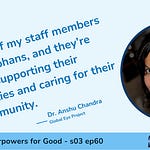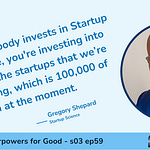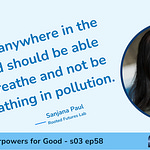Devin: What is your superpower?
Andrena: I’d say compassion. You know, I’d say compassion. I think it’s lacking in the world. And I know it sounds so airy and flighty and idealistic, but I think compassion is my superpower.
“When [my parents] said, ‘Pack a bag, we’re going to America,’ I didn’t know what that meant,” says Andrena Sawyer about her experience fleeing civil war in Sierra Leone as a nine-year-old. “I remember hearing gunshots closer toward our move and not really knowing, but realizing there were more soldiers in our community.”
“One of my classmates had died, had been hit by a stray bullet,” she says. “But at nine, you know, you don’t process the weight of those things. You don’t connect the dots.”
When she came to the U.S., she didn’t understand whether it was for a visit or a permanent relocation. After she hadn’t seen cousins, aunts or other relatives in years, about age 12 or 13, she realized the move was permanent.
Around the same time, she realized she was lucky. “Well, what do I do with this luck?” she asked herself. “I begin to try to make an impact. I don’t know if it’s the guilt of, you know, survivor’s guilt, but I want to make an impact because I was one of the fortunate ones.”
She launched a nonprofit movement in her high school called Triple-T MAD for Teens Trying To Make A Difference.
“I just rallied my friends. It started off with some friends of mine from church. I was bored, and we would go out in the community once a month to help. So we did AIDS Walk, March of Dimes, soup kitchen, a lot of volunteerism, and it landed.”
For two years, she led the group, doing a service project every month.
“That laid the foundation for the rest of the work I’m doing now,” Andrena says. “It’s framed my professional work.”
Today in Baltimore, Andrena leads P.E.R.K. Consulting, advising nonprofits and small businesses.
Our focus is nonprofit development. I started it about 11 years ago because I really had a passion and an interest in helping nonprofits, especially the little guys, become more sustainable.
A lot of times we see that those that are doing the grassroots work in our community don't have a long shelf life. They run into cashflow issues, capacity issues, strategic planning issues, and I wanted to see how I could help that.
Andrena loves acronyms. P.E.R.K stands for passion, experience, relevance and knowledge. She teaches these principles and helps her clients institutionalize and systematize them.
“If you take a look at our logo, it’s a tree growing out of a concrete road because we take our interest in helping nonprofits grow despite whatever their initial foundation was,” Andrena says. “Those four things are the ways that we make sure that we do that.”
“The root of nine out of ten problems that we encounter with our clients is just the lack of good infrastructure that lends to sustainability,” she adds.
By way of example, she helps nonprofit clients build more diverse revenue streams, not “putting all [their] eggs in the grant bucket.” She says, “Sometimes that looks like additional streams, like special events, merchandise, things like that.”
What underlies all of Andrena’s work and success is her compassion, a superpower she deploys to serve others effectively.
How to Develop Compassion As a Superpower
Andrena exudes compassion. She works to incorporate it into her clients’ strategies as well. She’ll ask clients, “What is all your profit doing for the community? What are you doing for others who want to get to where you are?”
She adds, “I think humanity needs it, and I try to be as intentional about it as possible.”
For Andrena, there is a clear connection between her compassion and escaping civil war.
We never know what people are going through. We don't know the circumstances that they're facing at home.
When I came to America, my family was facing immense poverty because we were starting all over again.
So, as an individual now making philanthropy and compassion a core value of mine, it's because of those things that I went through escaping civil war.
When Andrena launched her business, she created a scholarship fund to help students in situations similar to what she’d been through as an immigrant.
When I went to college, I was a first-generation college graduate and I faced a lot of hardship because I was not a US citizen, so I wasn't eligible for FAFSA and Federal Aid and things like that.
So, despite being a really hard-working student, it was a struggle just even trying to get through college. When I started P.E.R.K., I said that was one of the things we would be intentional about is just a portion of our revenue is going to go to a local student who is an international student but who is extremely hardworking.
The next gen scholarship program was $1,000 that we gave to an international student who had, I think it was a 3.5 GPA or higher when we started. I was very proud of that.
To some people, when we said $1,000, some people kind of thought, you know, what is $1,000 going to do? But then I remember when I was a student, $1,000 meant the world—it meant books. It might have meant meal plan.
I was extremely proud of that. Extremely proud of that.
Learning to strengthen compassion can be difficult. “When we get into business, I think we’re trained to look at profit, profit, profit, profit,” she cautions. “So we just become outcome-driven, just bottom-line driven.”
Andrena has some guidance for strengthening your compassion.
First, she says, “Get out of your own bubble just long enough to see the reality of others.”
To the person who wants to train that muscle a little bit more, I would say expand your horizons and take a look at the reality of what other people are going through. And a lot of times we don't have to look far.
When we intentionally engage in conversations, authentic conversations with people and we take a genuine interest in how their life is going, a team member or volunteer someone that you might engage on a regular basis in the worship space or whatever—in class. When we ask people [for their] stories, we begin to see that the world is a little bit bigger than us.
If you want to take it up even a notch higher, I would say go outside of the country, go outside of your city and engage with people because we're very fortunate and we're very wealthy in this country, in America especially.
I live in Baltimore City.
Baltimore City is notorious because of the disenfranchisement of the people. So you can be on one street in Baltimore City and there are well-maintained buildings, nice looking lawns, and you walk two blocks down and you're seeing torn down buildings, drug addicts.
But what happens is when we stay just in our part of the block, we forget that there are other areas in our city and in our lives where people need help.
So, if you are serious about about, again, training that compassion muscle, I would say get out of the bubble long enough to engage with others, watch a TV show that's about people from developing countries and just see where you can help and where you're needed.
If you follow Andrena’s example and her advice, you can strengthen your compassion muscle until it becomes your superpower, enabling you to do more good in the world.















